- Home
- Nancy Warren
Baker's Coven Page 8
Baker's Coven Read online
Page 8
“You can do this, Evie,” I said, handing her the fresh-squeezed orange juice. “We all believe in you.” I gave her my widest smile, and then went to check on my oven temperature. I couldn’t afford to make any silly mistakes either. And that’s when I spotted Gerry, peering over Evie’s shoulder as she remixed her batch.
“Looks like someone’s even unluckier than me,” he shouted across the room. “Except the worst thing that can happen to her is getting sent home. Not sent to the spirit world.”
Oh, Gerry. At least it was getting easier to ignore his commentary. He’d become a bit like an annoying buzzing sound in my ear that I’d gotten used to pretending wasn’t there.
The madeleines only needed eight minutes to bake, so I slid them into the oven and wished them well on their journey to golden brown. It was such a ritual, I wondered if I was unconsciously putting a spell on my baking. Magic was forbidden—no way would I disobey that order—but I’d always wished my baking well. Would I have to stop? But how could wishing my baking well make a difference? I laughed to myself before remembering that I was still being filmed. Don’t be a doofus, Poppy.
I fussed with my icing, getting the bag perfect so I could pipe my icing onto the little cakes. As I did so, I let my thoughts drift back to Broomewode Hall. I couldn’t wait to deliver my gooseberry stash to Katie. This time I was determined to not only make her spill the village gossip but also to help devise a way for me to look at that oil painting in the dining room up close. Whether I liked it or not, getting Katie on my side was going to involve a bit of truth-telling. If I could get her to feel a little more sorry for me, poor orphaned Poppy, left in an apple crate, then maybe she’d be more willing to help.
When the eight minutes were up, I removed my madeleines from the oven. They looked perfect, golden brown and with a nice, dense, cakey look to them. Phew.
I let them cool on a rack while I got my plate ready.
“You have two minutes left, bakers,” Arty called out.
I jumped in my skin. What? Two minutes? How had I lost track of time?
Frantically, I began to pipe Eiffel Towers. Until you have piped a thin stream of chocolate icing onto a barely-cooled madeleine, with a clock ticking down, and the knowledge that millions of people will one day be watching you, you don’t know pressure.
What had I been thinking? I should have gone for sprigs of lavender, or even icing meant to mimic lavender. But the Eiffel Tower? It was fiendishly difficult, and the icing wouldn’t go on straight, as my hands were slick with nerves.
With thirty seconds to go, I chose the best-looking eight from the dozen I’d baked. Most of them looked more like the Hindenburg than the Eiffel Tower, but there was nothing I could do but carefully arrange them on a blue ceramic plate. When the clanger went, I breathed out a sigh of relief and then walked back over to the judging table. All I could do now was wait and hope I’d done enough to secure my entry to next week’s round.
I took a look at the array of madeleines. Although I’d watched the show so many times at home, I was still surprised at how different everyone’s baking looked even though we’d all followed the same recipe. Some were a deeper color, some a little…puffier. I didn’t fancy those. The decorations ranged from simple—Maggie had merely sifted icing sugar onto hers, going for a classic look—to elaborate. Florence had used almond essence and dipped the edges of her cakes into dark chocolate and slivers of almond. They looked elegant and perfect.
Mine looked absolutely amateur by comparison. I also didn’t feel as attached to my batch as I had to my cake. I’d poured so much of my personality into that little gooseberry guy that making another person’s recipe meant that the whole challenge felt, well, less personal. Even still, I held my breath again as Elspeth and Jonathon whipped through the tasting. What if I had made a silly mistake? Did I leave out the sugar? Could I?
When it was my turn to be judged, Jonathon said, “You made a bit of mess with your icing, Poppy,” and Elspeth nodded. Still, when they tasted my little cakes, Jonathon complimented the airy texture, and Elspeth said it had a nice crumb to it. The rest of the judging went by in a blur. Amara was crowned the winner of the round, having painted each of her cakes with food coloring, so they looked like tiny, perfect impressionist paintings. Maggie was second, because the judges said she’d gone with simplicity in her decorating but perfection in her batter. Euan was third. Maybe because she’d started again from scratch, poor Evie hadn’t managed to bake her madeleines for long enough, and they were wet in the middle.
“Not enough flour in these, Evie,” Jonathon said, shaking his head.
“I think you mean they’re undercooked, Jonathon,” Elspeth said, shooting him a quick glare. They had to film that little critique again, with Jonathon correcting himself and poor Evie trying to stifle a sob. Everyone crowded round to comfort her. “I know exactly how to make them. I don’t know what’s wrong with me,” she whispered.
Evie was second from last. Gaurav had overbaked his, so the judges complained that madeleines weren’t meant to crunch. “It’s not a cookie, mate,” Jonathon reminded him.
I ended up fifth. Florence sixth. Seemed she went too heavy on the almond essence and had overbaked her pretty cakes.
Although I hadn’t made the top three, I tried not to feel too badly about it. Maybe I’d just run out of steam after my win this morning. Florence hadn’t made the top three either. She pouted and looked upset as filming ended and the crew dug into the plates of madeleines. I honestly didn’t know where they managed to put all that cake.
“Don’t worry, Florence,” I said, taking her hand. “Tomorrow we’ll both claw our way back into the top three.”
Her eyes brimmed with tears. “What if I don’t do well tomorrow, either? I could be sent home.” It was a bit dramatic, but that was Florence. Film star to the core, married to the drama. But, she was right. Any of us could end up going home.
For now, I was just glad to take off my butter-smeared apron, and with filming finally over for the day, it was the perfect time to visit Susan, tell her the good news about my big win, and give Sly that juicy bone I’d promised him. I’d managed to save a slice of the gooseberry cake for Susan and only hoped she’d like it as much as the judges had.
As soon as I stepped foot out of the tent, there was Sly, tail wagging, orange ball at his feet. I looked down at myself and realized that this gooey, slobbered-on dog’s ball exactly matched the color of my shirt.
All the viewers had gone home for the day. No doubt they had lives to live, and the afternoon had grown chilly. Peter Puddifoot came stomping down the path from the manor house. I bet he’d been up there complaining about people daring to stand on “his” lawn. I wondered why the Champneys put up with him. Or were they stuck with him? Perhaps he was Grade II listed like that ancient and dangerous tower?
“Sly,” I said, bending to give him a stroke. “What are you still doing here? Susan is going to be worried. Or she’ll think I’m a dog-napper.” Come to think of it, if I ever had a dog, I’d want one exactly like Sly.
He wagged his tail in response and nosed his ball toward my feet.
“I’ve got something even more exciting than your ball,” I promised him, gripping the bag with the bone. He sniffed greedily, then grabbed the ball between his strong teeth and dropped it at my feet. Play before food, he seemed to be saying.
“Come on, then, you pesky thing.” I threw the ball as far as I could and began walking in the direction of Broomewode Farm.
The sun was making its way behind the trees now, and Broomewode Hall was cast in a marigold glow. Later, I’d visit Katie and bring her my gooseberry haul from Susan’s plot. I pictured the joy on her face when she saw them, knowing that she could make the Champneys their jam without having to pick one-handed. I did hope her broken arm was healing well. Once inside the house, I’d have to find a cunning way to get into the dining room and examine the painting of the woman in my baby blanket up close. But the details of that pa
rticular scheme could be worked out later. Today was about celebrating and recharging before the final challenge.
I slipped on my cardigan and buttoned it up. It was amazing how cool early evening could get at this time of year, but I definitely still felt that warm glow inside from my win this morning. I took out my phone to call my parents and tell them all about it. It’d been ages since we last spoke, mostly because I didn’t want to worry them with the drama of the last week. But now—finally—I had good news.
My dad answered the phone. “Poppy. We’ve been waiting for your call. How’s it going? Is our girl the star baker? You know, whatever happens, you’re always the star baker to your mother and I.”
I loved how supportive they were. Whatever my origins, I had to remember how lucky I’d been to end up with Agatha and Leland as my parents. And whatever I learned of my heritage, they would always be my mom and dad.
“Let me put you on speakerphone. Mom’s right here.”
There was a shuffle and then my mom’s voice came on the line, flooding me with the same kind of warmth that lately only Elspeth had been able to provide. It was so nice to hear her. I gave them both a blow-by-blow account of my gooseberry win, and they were thrilled. A little too thrilled. “We’re so proud of you. When you didn’t call after last week, we thought maybe you’d been voted off and didn’t want to talk about it.”
I felt immediately guilty. It wasn’t my performance on the show I’d wanted to keep from them but the horror of a murder in the tent. However, I could tell them all about that when filming was over. Living in the south of France, they were unlikely to hear there’d been a murder. Someone, somewhere must have some pull, for there’d been surprisingly little coverage of the baking show crime. “You have to promise me that you won’t tell anyone. You have to keep this under wraps until the show airs, okay? I could get in serious trouble.”
“Do you want us to sign a non-disclosure agreement?” Dad was joking, but I really shouldn’t have told them about my baking win. However, I knew I could trust them. They’d be able to enjoy my win and talk about it when they were on their own. I couldn’t imagine not telling them.
“We promise, Pops,” my mom said. “But on one condition: you promise to come visit once filming is done. It’s been far too long. We miss you.”
I made my promise. I missed them, too.
By the time I’d hung up, Sly and I had reached the farmhouse, its sprawling shape silhouetted against the setting sun. The Range Rover was out front, and lights were on inside, but when I rang the doorbell, there was no answer.
“That’s odd,” I said to Sly. “Maybe they’re out back and can’t hear me?”
But Sly dropped his ball and raised his nose in the air, sniffing. I saw the ruff on his neck rise, and he began whining.
“What is it, hey? What are you trying to tell me?”
Sly kept sniffing the air and suddenly began to bark. Then he nudged me, ran off and turned, so clearly waiting for me to follow. So, dutifully, I did.
I didn’t want to be snooping on near-strangers’ property, but Sly wasn’t the goofy playmate obsessed with his ball. He’d transformed into working dog mode, and he was definitely trying to herd me somewhere he thought I should go.
As we turned and approached the left side of the house, I could see the outline of the chicken coop and Susan’s beehives in the distance. Sly bolted toward them. What was he going to do? Herd the bees?
He began to run and, again driven by an impulse I didn’t fully understand, I broke into a run and followed.
For the second time that week, I wished I’d spent a little more time on the treadmill and less time baking. I made a mental promise to hit the gym this week. Clearly, I had to be prepared for anything. Like spontaneous dog-running.
But as we got closer to the beehives, I saw exactly why Sly was sprinting. Instead of neat rows of hives, one had toppled over, and a swarming, buzzing, great mass of bees had formed into an angry ball. Sly turned back to me and barked again. I swear he was telling me to get a move on.
And that’s when I saw the Bentleys.
Arnold was on the ground, flat on his back, and Susan was on her knees beside him, frantically searching his pockets. There were bees zooming all around the pair, but Susan didn’t seem to notice.
For a man with a bee allergy, Arnold Bentley couldn’t be in a more dangerous place.
“Susan?” I called out. “What can I do?”
She looked up at me, horror-stricken, her red cheeks now deathly pale.
“His EpiPen!” she shouted. “I can’t find it, and I can’t leave him. There’s one in the kitchen.”
Time slowed right down. I looked at her, then at the fallen beehive, and back to the body of her husband, which was twitching now with an alarming motion.
I sprang into action. No way was someone else going to die this week. Not on my watch, and not if Sly had anything to do with it, either. I turned and began to run back, not caring that my lungs were bursting and I had a stitch in my side. Sly was a black and white blur as he ran past and ahead of me, toward an open side door. Sly barked twice, and I took that as confirmation it was the right entrance. I ran like a maniac, almost tripping over a stray vine, and into the farmhouse.
Once inside, I couldn’t figure out where the kitchen was. I looked about the flagstone hallway in a fluster, stepping over abandoned gumboots and almost clattering into an umbrella stand. An old oak table held a newspaper and a half-drunk mug of coffee. Bookcases lined the hallway. I needed to find the kitchen, find the EpiPen.
Sly barked and ran to the other end of the hall and stopped at a small ottoman, illuminated by a table lamp with a striped cream lampshade. I dashed over and found a round ceramic dish with two pairs of keys and an EpiPen nestled inside. Yes! “Good boy,” I panted, grabbing the pen.
I ran back to the Bentleys.
Susan had her head on her husband’s chest and was sobbing.
“I’ve got it! I’ve got it!” I cried out, jubilant, thrusting the pen in Susan’s face.
She lifted her head wearily. Her eyes were red and streaming. In a tiny voice, she said, “It’s too late. He’s…he’s dead.”
Chapter 8
It was night by the time DI Hembly and Sgt. Lane knocked on Susan’s door. I’d watched the color of the sky change through the latticed windows—dusky pink to rich orange until the horizon was shot through with inky black. The ambulance had come and gone, and Sly lay at Susan’s feet, quietly guarding her. Comforting her.
“I can’t understand it,” she kept saying. “Why would he go near the hives? And without his pen? It doesn’t make sense.” It was like a loop that kept going round and round as she repeated the words.
We were both stunned, and I had no idea how to comfort this poor grieving woman. Widow, now. Anything I tried to say sounded corny or stuck in my throat.
It was me who’d called 999, then waited for the ambulance. Sadly, there was nothing the paramedics could do. Susan had been right. Her husband was dead.
She was in shock, and I couldn’t leave her, so I made mugs of tea, which lay untouched, steam floating up. For my part, I couldn’t believe that this was the second dead body I’d come across in two weeks. Was I a bad penny? Had I brought the bad juju to Broomewode Hall?
When the doorbell rang, Susan didn’t look up from the third mug of tea I’d made her, so I went to answer the door myself, my heart heavy. Sly barked and ran ahead of me to the door. It seemed I was part of his flock now, and he was a faithful guard dog.
In normal circumstances, opening the door to two police officers would bring on a bout of panic, but after the weird goings-on since I’d first arrived here, the sight of DI Hembly and Sgt. Lane was a strange comfort. They dealt with death every day. They’d know what to do.
Their features were already familiar to me: Sgt. Lane’s long Roman nose, deep-set brown eyes, full mouth, and clean-shaven cheeks inset with dimples that I suspected he despised. He must have been to the b
arbers since last week, because his flop of dark brown hair was shorter. As he gave me a small smile, his dimples transformed his serious face. DI Hembly’s gray buzz cut was perfectly crisp, and his square jaw remained serious. He wore a blazer over his white shirt and navy trousers, and his brown shoes were gleaming.
“Poppy,” DI Hembly said, somewhat taken aback, “I didn’t expect to find you here.”
And how I wished I wasn’t. I ushered the two officers inside the cottage. “I had come to visit Susan when her husband, Arnold, sadly passed away.”
“I see,” DI Hembly said in that soft, patient voice of his, which reminded me of my dad.
“Wrong place, wrong time,” I said, shaking my head.
“Is Susan Bentley inside?” DI Hembly continued.
I nodded and led them both into the kitchen. Susan was still staring at her mug of tea. She raised her head as we walked in, and DI Hembly introduced both the officers.
“Mrs. Bentley,” Sgt. Lane said, “I’m so sorry for your loss.”
Susan looked blankly at the officers and gave a short nod. Her eyes were red from crying, and her cheeks were streaked with fresh tears. The strong, solid woman I’d met on Friday had all but disappeared. “Police,” she said, as though she couldn’t believe they had any reason to be in her farmhouse kitchen, and, indeed, the two looked out of place among the big pots, the shelves of honey and the Aga stove.
“I’m afraid the police have to investigate all sudden deaths so that they can make a report to the coroner. There will have to be an inquest,” DI Hembly continued. “May we sit down and ask a few simple questions? We’ll get this over with as quickly as we can.”
“Of course, of course,” Susan mumbled. She picked up her teaspoon and heaped some sugar into her tea. One scoop, then two, then three. She stopped suddenly. “Oh. I don’t think I meant to do that.”

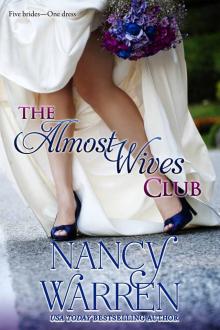 The Almost Wives Club: Kate
The Almost Wives Club: Kate The Vampire Knitting Club: First in a Paranormal Cozy Mystery Series
The Vampire Knitting Club: First in a Paranormal Cozy Mystery Series Stockings and Spells: A paranormal cozy mystery (Vampire Knitting Club Book 4)
Stockings and Spells: A paranormal cozy mystery (Vampire Knitting Club Book 4)_preview.jpg) Chance Encounter (Take a Chance: Prequel)
Chance Encounter (Take a Chance: Prequel) Let it Snow
Let it Snow Kiss a Girl in the Rain
Kiss a Girl in the Rain A Spelling Mistake
A Spelling Mistake Fair Isle and Fortunes
Fair Isle and Fortunes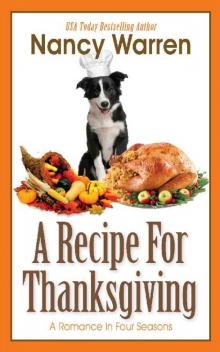 A Recipe for Thanksgiving
A Recipe for Thanksgiving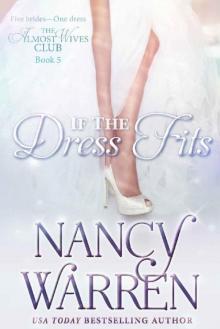 If the Dress Fits
If the Dress Fits Cat's Paws and Curses
Cat's Paws and Curses A Midsummer Night's Wedding
A Midsummer Night's Wedding Arthur
Arthur Bobbles and Broomsticks
Bobbles and Broomsticks Jack
Jack Crumbs and Misdemeanors
Crumbs and Misdemeanors Crazy Ride
Crazy Ride George
George The Wedding Flight
The Wedding Flight Fast Ride
Fast Ride A Diamond Choker for Christmas
A Diamond Choker for Christmas Baker's Coven
Baker's Coven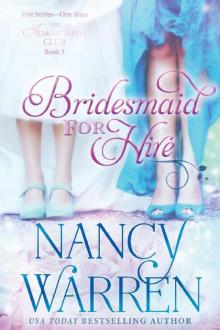 Bridesmaid for Hire
Bridesmaid for Hire Stitches and Witches: A Paranormal Cozy Mystery (Vampire Knitting Club Book 2)
Stitches and Witches: A Paranormal Cozy Mystery (Vampire Knitting Club Book 2) Diamonds and Daggers
Diamonds and Daggers Ribbing and Runes
Ribbing and Runes Courting Chloe
Courting Chloe Blood, Sweat and Tiers
Blood, Sweat and Tiers By the Book
By the Book My Fake Fiancee
My Fake Fiancee A Dog Named Cupid
A Dog Named Cupid Chapter and Curse
Chapter and Curse Her Valentine Fantasy
Her Valentine Fantasy The British are Coming Box Set
The British are Coming Box Set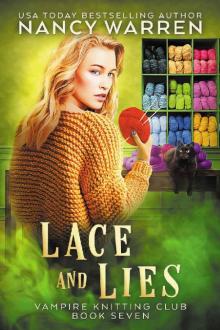 Lace and Lies
Lace and Lies Wild Ride
Wild Ride Unwrapping Santa
Unwrapping Santa Popcorn and Poltergeists
Popcorn and Poltergeists Best Man...with Benefits
Best Man...with Benefits Breathless
Breathless Frosted Shadow - A Toni Diamond Mystery
Frosted Shadow - A Toni Diamond Mystery Crochet and Cauldrons: A paranormal cozy mystery (Vampire Knitting Club Book 3)
Crochet and Cauldrons: A paranormal cozy mystery (Vampire Knitting Club Book 3) Sea Kissed, A Crane Series Romance: Crane Series
Sea Kissed, A Crane Series Romance: Crane Series Bad Boys Down Under
Bad Boys Down Under Aftershocks
Aftershocks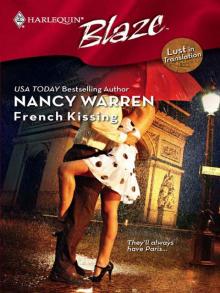 French Kissing
French Kissing Too Hot to Handle
Too Hot to Handle The Fourteen Million Dollar Poodle
The Fourteen Million Dollar Poodle The Great Witches Baking Show
The Great Witches Baking Show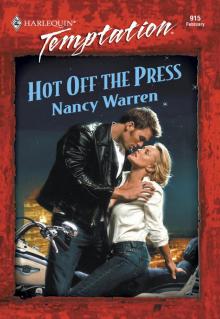 Hot Off the Press
Hot Off the Press British Bad Boys
British Bad Boys By the Book_A laugh-out-loud feel good romantic comedy
By the Book_A laugh-out-loud feel good romantic comedy Star Kissed: A Crane Series Romance
Star Kissed: A Crane Series Romance Secondhand Bride (The Almost Wives Club Book 2)
Secondhand Bride (The Almost Wives Club Book 2)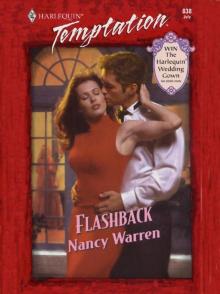 FLASHBACK
FLASHBACK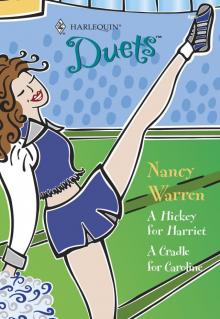 A Hickey for Harriet & a Cradle for Caroline
A Hickey for Harriet & a Cradle for Caroline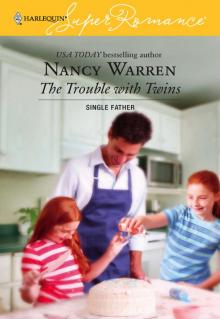 The Trouble with Twins
The Trouble with Twins Iris in Bloom: Take a Chance, Book 2
Iris in Bloom: Take a Chance, Book 2 Face-Off
Face-Off The Vampire Knitting Club: A cozy paranormal mystery series
The Vampire Knitting Club: A cozy paranormal mystery series Private Relations
Private Relations Ultimate Concealer, A Toni Diamond Mystery: A Toni Diamond Mystery (Toni Diamond Mysteries)
Ultimate Concealer, A Toni Diamond Mystery: A Toni Diamond Mystery (Toni Diamond Mysteries) Just One Night
Just One Night Breakaway
Breakaway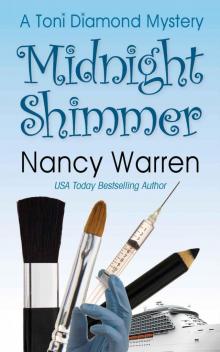 Midnight Shimmer: A Toni Diamond Mystery (Toni Diamond Mysteries Book 3)
Midnight Shimmer: A Toni Diamond Mystery (Toni Diamond Mysteries Book 3) Live a Little!
Live a Little! Bayou Bad Boys
Bayou Bad Boys Sun Kissed (Crane Series)
Sun Kissed (Crane Series) Rich Bitch: Everything's Going to the Dogs
Rich Bitch: Everything's Going to the Dogs Game On
Game On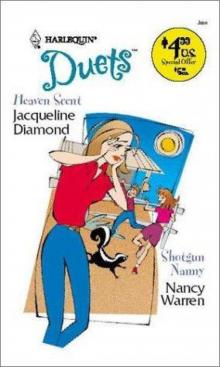 Shotgun Nanny
Shotgun Nanny Steamy Southern Nights
Steamy Southern Nights